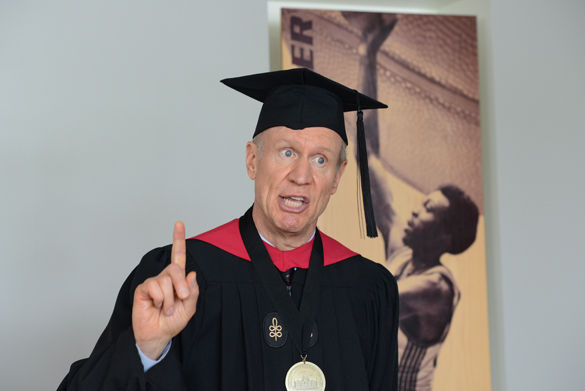Opinion: Higher ed needs more realistic state funding

Gov. Bruce Rauner talks at a press conference after speaking at the afternoon commencement ceremony. Rauner was invited to speak at the ceremony before proposing to cut funding to the university by $44 million. An online petition, which reached 2,700 signatures, was begun last month in an attempt to have him removed as the keynote speaker, stating that “Choosing him as a keynote speaker is a slap in the face to SIU students and faculty who alreay deal with underfunded programs and facilties.”
March 20, 2016
Gov. Bruce Rauner wants to give the state’s public universities some grades, and base part of their funding on how they perform.
That’s the basis behind the governor’s latest proposal for spending in higher education. He is advocating a 20 percent cut in guaranteed state support for public university operations next year, but will add an additional $50 million on “performance-based funding.”
While that’s a worthy idea, the state’s universities need an immediate funding solution. Without a state budget, many universities are struggling. Chicago State University is in danger of closing and Eastern Illinois University has laid off hundreds of faculty and staff until a budget is approved. The universities need some sort of immediate funding.
Advertisement
But the solution isn’t the $3.8 billion bill passed Thursday by Democrats in the Senate. The state doesn’t have any money, so bills like those approved Thursday are like writing bad checks.
MORE: Senate Democrats approve spending $3.8 billion GOP says Illinois doesn’t have
Ultimately, the universities have to accept spending reforms. Although each university in the state is different, many have spent taxpayer dollars with abandon and created multi-layered bureaucracies that do little to educate students or help the state. Leadership at the universities has to understand they will need to change.
Some of that change could include performance-based funding, which is growing in popularity across the United States.
In those programs, universities would compete based on the number of degrees they award, the cost per degree, the amount of money spent on research and public service and other measures designed to show how well universities are doing at serving the public and providing high-quality, affordable education.
These types of program are not without their own issues.
Nationally, such programs have caused some schools to admit fewer “borderline” students in order to improve their scores.
Advertisement*
Southern Illinois University President Randy Dunn, who supports performance-based funding, told a Senate committee last week that is one of his fears. Eastern Illinois President David Glassman said he welcomes the idea of funding based on performance and believes Eastern would perform well on many of the measures.
Performance-based funding is not new to Illinois, but Rauner is proposing to make it a larger part of higher education funding.
In the last years when performance-based funding was awarded, the total was about $6.2 million out of a $1.2 billion budget. The $50 million figure would be about 5 percent of the proposed $1.01 billion budget.
What’s clear is that the Illinois public university system is going to have to make several changes.
By some counts, as high as 40 percent of Illinois high school graduates are leaving the state to attend college. Many students and parents are finding out-of-state tuition to be a better bargain than attending a university in Illinois.
The first step should be to stabilize funding for the universities in a meaningful way. However, that should be quickly followed by spending reforms, including performance-based funding, that will ensure the university system is offering an effective and efficient education.
___
(c)2016 the Herald & Review
Visit the Herald & Review at www.herald-review.com
Distributed by Tribune Content Agency, LLC.
Advertisement







